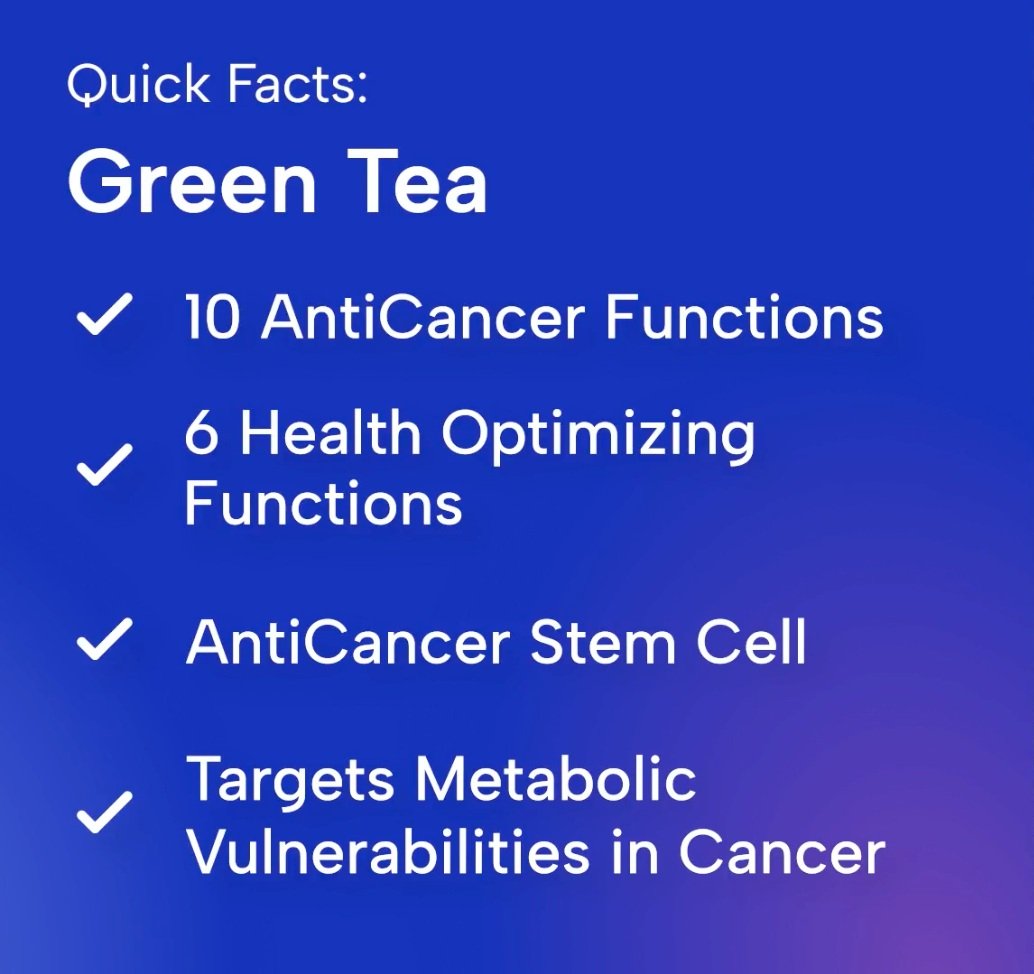Anti-Cancer and Health Promoting Power of Green Tea
Hi tea lovers! Today we are looking at the health promoting powerhouse that is Green Tea. Green tea has been cherished for thousands of years, not just for its taste, but for its incredible health benefits. Scientists are uncovering what ancient healers always knew - this humble leaf is packed with health-boosting potential. From fighting free radicals to killing cancer cells, green tea is proving to be a true superfood.
Green Tea's Cancer-Fighting Potential
Medical journals are littered with numerous studies that lay out convincing evidence that green tea can play a big role in:
◉ Preventing cancer from forming
◉ Fighting active cancer
Scientific Evidence Green Tea Kills Cancer Cells
Here are two summaries from important studies that examined the anticancer capabilities of Green Tea:
This study provides compelling evidence for Green Tea’s potential in cancer prevention and treatment. The key players are compounds called catechins, particularly one named epigallocatechin-3-gallate (EGCG). These natural substances have shown remarkable abilities to fight cancer at various stages, from preventing its initial formation to slowing its growth and spread.
◉ Triggering cancer cell death (apoptosis)
◉ Slowing tumor growth and spread
◉ Blocking formation of new blood vessels that feed tumors
◉ Reducing inflammation and oxidative stress
◉ Modifying cell signaling pathways involved in cancer development
The study found these effects in many types of cancer, including breast, prostate, liver, colorectal, and lung cancers.
Matcha Green Tea Shown to Kill Cancer Stem Cells
Cancer stem cells (CSCs) play a crucial role in cancer development, progression, and recurrence. These cells have the ability to self-renew and differentiate into various cell types within a tumor. CSCs are particularly problematic because they are often resistant to conventional treatments like chemotherapy and radiation, leading to tumor recurrence and metastasis even after apparent remission.
This study investigated the effects of Matcha green tea (MGT) on breast cancer stem cells. The key findings include:
◉ Green Tea effectively inhibited the propagation of cancer stem cells.
◉ MGT treatment reduced both mitochondrial metabolism (oxidative phosphorylation) and glycolysis in cancer cells. This is significant because CSCs often rely heavily on these metabolic pathways for energy and survival.
◉ The effects of MGT on cancer stem cells were similar to those of the antibiotic doxycycline, which has been studied for its anti-cancer stem cell properties.
These findings suggest that green tea could be a promising natural compound for targeting cancer stem cells, potentially reducing the risk of cancer recurrence and metastasis.
NutriLiv Reveals All of Green Tea’s AntiCancer and Health Optimizing Capabilities
The image below displays a brief scorecard of the cancer fighting functions and health boosting capabilities of Green Tea. Readers can watch the video to get a more in depth look into Green Tea’s profile in the AntiCancer Nutrition App, NutriLiv.
NutriLiv help people make evidence based anticancer nutrition decisions
◉ Allowing users to search for foods, supplements, and natural extracts known to inhibit cancer cells from accessing glutamine and glucose
◉ Providing clear item profiles that break down how each item is known to kill cancer cells
◉ Offering detailed evidence of how items block cancer from glutamine and glucose
◉ Enabling users to track their anticancer nutrition progress
Every time you eat, it is an opportunity to hit the disease with nutrition that is known to have anticancer capabilities. NutriLiv can help you use the latest evidence to win the battle.








